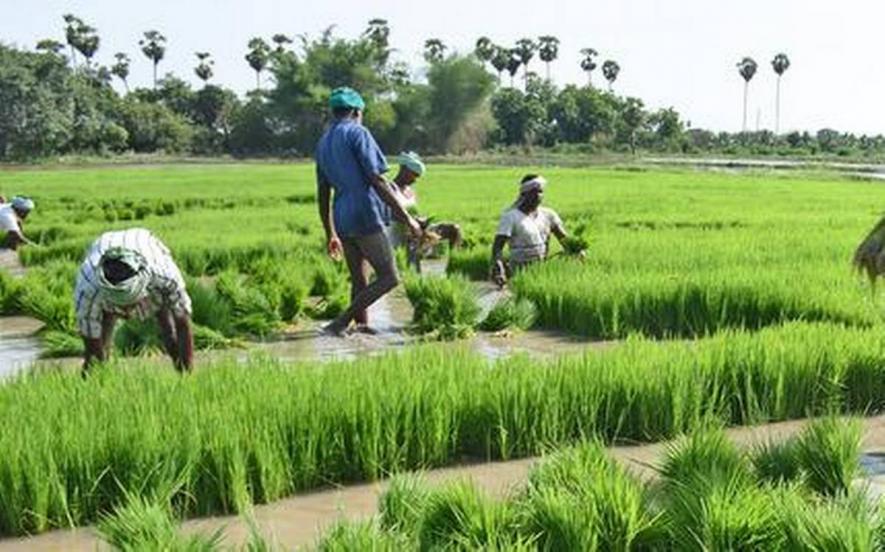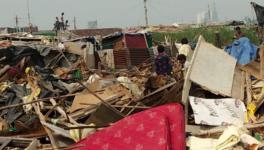Protected Special Agricultural Zone in Tamil Nadu: Farmers’ Interest or Political Interest?

Representational Image. Image Courtesy: Hindu Business Line
The rice bowl of Tamil Nadu, the Cauvery delta region will be converted into a Protected Special Agricultural Zone (PSAZ), Chief Minister Edappadi K Palanisamy announced on February 10. Tanjavore, Tiruvarur and Nagapattinam districts and parts of Ariyalur, Pudukottai, Cuddalore, Karur and Tiruchirapalli will be included in the PSAZ. The decision comes after a sustained protest was waged by farmers, youth, political and civil society organisations, as the farmers were facing severe issues due to continuous oil spillages, water, air and soil pollution.
However, the move which is being received with enthusiasm has raised a few questions as well. The exclusion of certain areas of the districts, the state government’s decision to stop any further exploration process and the single licensing policy for exploring all forms of hydrocarbon as per the Hydrocarbon Exploration and Licensing Policy (HELP) have raised suspicions over the positive outcomes of the announcement.
ENSURE LEGAL VALIDITY
Even as the CM announced that the government will consult legal experts on PSAZ, the opposition parties have demanded the government to amend the legislation to ensure the validity of PSAZ by convening a special Assembly session. Other states to have implemented the special zones to protect agriculture include Kerala, Karnataka and Uttarakhand.
V Sethuraman, leader of the Tamil Nadu Science Forum (TNSF), while speaking to NewsClick said, “The government of Tamil Nadu can follow its Kerala counterpart in framing an effective legislation to announce the SPAZ. The Left Democratic Front (LDF) government in Kerala has effectively implemented the Protected Agricultural Production Zone (PAPZ) extending from Kuttanad area to Palakkad district as per the recommendation of a commission headed by M S Swaminathan. Our state government must ensure that the proposed PSAZ must protect the interest of the farmers and facilitate farming in the area and ensure legal validity for the zone.”
PROMOTE AGRI-RELATED INDUSTRIES
The PAPZ in Kerala has ensured that no other industries are permitted to function in the zone. The farmers of the region also expect the same restriction to be incorporated in the proposed PSAZ in the Cauvery delta region. The relaxation of norms and conditions, a common issue in the state, will lead to the complete destruction of agriculture in the region. The farmers expect the zone to incorporate industries that prioritise value-added agricultural products to facilitate employment generation.
“Mechanisation of various agricultural processes is continuously increasing and the zone shall incorporate provisions to establish industries manufacturing such equipments. Several governments across the country grant countless number of facilities and exemptions to companies in the Special Economic Zones (SEZ) and the same tax exemptions shall be made available to such industries here as well. Such a move will benefit both the farmers and the educated youth of the locality in getting respectable employment,” Sethuraman added.
STATE GOVERNMENT PLAYING SAFE?
The state government, in a surprise move, also announced that no further hydrocarbon projects will be permitted in the state. However, it did not specify anything on the status of the ongoing projects in the delta region. The vague announcement has raised questions among the farmers and environmental activists, especially with the union government implementing Hydrocarbon Licensing and Exploration Policy (HELP) which grants the companies the permission to explore the presence of all types of hydrocarbons in the region.
Nityanand Jayaraman, environmental activist, said, “The process of exploration and extraction are highly unregulated in the state leading to several accidents. The exploration of other hydrocarbons including tight gas and shale gas in the region would further damage the environment. The Oil and Natural Gas Corporation (ONGC) and Vedanta are presently pumping the produced water which is highly toxic to deep wells. The exploration of hydrocarbons needs deeper digging and hence the produced water will be more toxic”.
POLITICAL VICTORY FOR AIADMK?
The ruling All India Anna Dravida Munnetra Kazhagam (AIADMK) has been under severe attack by the opposition parties and farmers’ organisations for being a junior partner of the Bharatiya Janata Party (BJP). The AIADMK government, meanwhile, seems to be distancing itself from the BJP after its dismal in the general elections in Tamil Nadu while it managed to save its face in the by elections to the state Assembly.
The delta region is not a stronghold of the AIADMK and the continuous protests have been tarnishing the image of the party and government in the region. The use of police force by the government to suppress the farmers’ struggle has also been widely criticised.
The continuous setbacks have apparently led to the announcement of the SPAZ by the AIADMK government. The union government in a cabinet meeting decided to move the Cauvery delta region from Category 1 to 3A which requires only the clearance from the Tamil Nadu Pollution Control Board (TNPCB) to proceed with process of exploration and extraction. The BJP leaders have been stating that the responsibility of hydrocarbon exploration and extraction lies with the state government. The announcement of the state government has come as a setback to the BJP which had tried to pass the buck to the state government. The farmers and environmental activists expect the PSAZ to be an effective measure to protect and facilitate farming and save the rice bowl.
Get the latest reports & analysis with people's perspective on Protests, movements & deep analytical videos, discussions of the current affairs in your Telegram app. Subscribe to NewsClick's Telegram channel & get Real-Time updates on stories, as they get published on our website.






















